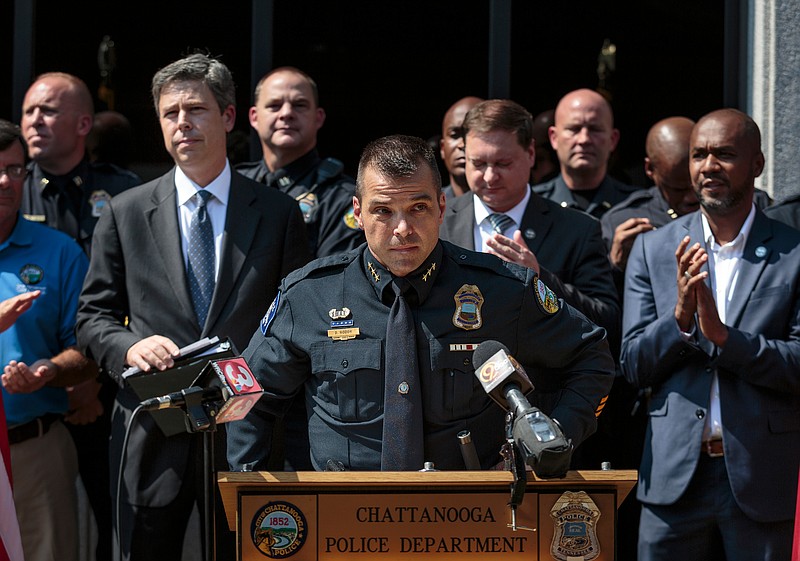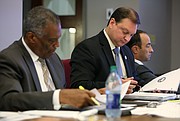Chattanooga Mayor Andy Berke's proposed budget for the next fiscal year includes increased expenditures for city police, including a 3 percent salary increase for all sworn officers and a $1.7 million expenditure for a new gun crime unit, which would boost the department's budget by almost $6.5 million to a total of $70 million.
The pay increases come at a total projected cost of $1.4 million and are the latest effort by Berke's administration to attract and retain officers by addressing concerns about compensation.
In addition to the across-the-board raises, new officers would see annual raises for their first six years in the department as opposed to every two years. Newly named police Chief David Roddy said those initial raises are essential to attracting and keeping those officers in the beginning stages of their careers.
"We see that is the most critical component of where individuals will leave, not the profession necessarily, but just their job at the time," Roddy said.
Under the proposed budget, officers would start at $36,990 instead of the $35,913 they are paid in their first year now. After six years with the department, they would be making $42,882 a year rather than $39,243.
At the upper end of the pay scale, a 30-year police captain would top out at $84,631 instead of the current $77,450.
The new pay increase also has the effect of increasing salary gaps between ranks, which Roddy said will provide more incentive to climb in the department.
"We're compensating people wanting to do more with their city," he said.
"Incentivizing in the public sector is hard and it's hard to do financially, but what little you can do - when you change a pay structure, when you affect your overtime, when you affect the incentivization to promote - you're keeping people happy."
Berke said he was glad to continue supporting the police department by shifting the pay scale upward to compensate officers more.
"To recruit & retain the best talent at CPD, we have worked with police administration, officers, and employee groups to craft a better pay plan for Fiscal Year 2018," he said in an emailed statement.
"The plan we announced [Tuesday] helps us retain officers as well as raise salaries, and it creates additional fairness in steps to encourage great officers to seek promotion. By investing in this new plan, we are helping to keep our city safe by retaining our best officers and ensuring more quality officers are serving and protecting Chattanooga's neighborhoods."
The existing pay structure was put into place in 2014 as part of a memorandum of understanding signed by Berke to shore up the financial security of Chattanooga police officers. The memorandum stated that significant pay disparities had developed in the department "due to the lack of a comprehensive pay plan and other factors."
Also included in the budget is an $18.4 million shot in the arm to the fire and police pension - $5.1 million more than 2016. Berke said earlier this year that more contributions would be necessary to shore up the underfunded pension plan to bring it in compliance with a new state mandate.
The Times Free Press previously reported that in 2016 actuaries calculated the fire and police pension was $150.6 million short of the money needed to meet all of its future funding obligations.
The pension fund had less than 62.1 percent of what actuaries recommended at the start of calendar year 2016. The shortfall is expected to widen this year as the city changes its earnings assumptions for the plan and reduces the projected rate of return on its investments from 7.75 percent a year down to 7.5 percent per year.
Speaking on the increases planned for next year, Sgt. Sean O'Brien, president of the Fraternal Order of Police, said they are the second part of a process that began in 2014.
"By now, almost every single individual impacted by that is where they're supposed to be," he said. "I think it's hugely significant and speaks from my perspective to Mayor Berke's commitment to this city's police officers."
"If we want to have a professional police department that represents our community, you have to be competitive in compensation."
The single largest expense for more personnel in the police department, according to the proposed budget, is the creation of 14 sworn positions to staff a new gun unit and rapid response teams to handle shooting incidents.
As described now, the Firearm Violence Elimination Strategy would rely on the five-person gun team and the nine officers on the response teams to follow up on dispatched calls about shots fired throughout the city.
"These don't have to be homicides, these don't have to be shootings - they could be shooting up houses," said Sgt. Josh May, head of the Chattanooga Police Department's anti-gang efforts.
The people hired into those positions would focus on ballistic matches from evidence gathered at scenes and entered into a database called the National Integrated Ballistic Information Network in order to track gun crimes, identifying consistently used firearms and the offenders who use them.
In a short presentation to city council members Tuesday, May showed a diagram linking 29 firearms to 20 shooting incidents. He said important strides could be made in combating violent crime by leveraging the technology available to connect shell casings and guns to the people pulling the triggers.
"We've taken off the streets in the last three years over 3,300 guns," May said. "Those guns are sitting in our property division right now. There are homicide firearms in there, we know that," he said.
"My vision was before we get to a homicide, utilize this technology, this manpower, on these shots fired to link this gun to this person to make quality cases."
The city council still needs to approve Berke's proposed budget, and the first official reading is scheduled for its Sept. 5 meeting. Council members will have a final reading and a vote to approve the budget the following week.
Contact staff writer Emmett Gienapp at egienapp@timesfreepress.com or 423-757-6731. Follow him on Twitter @emmettgienapp.

